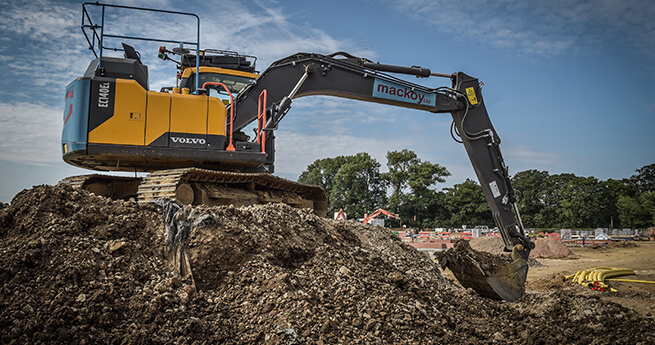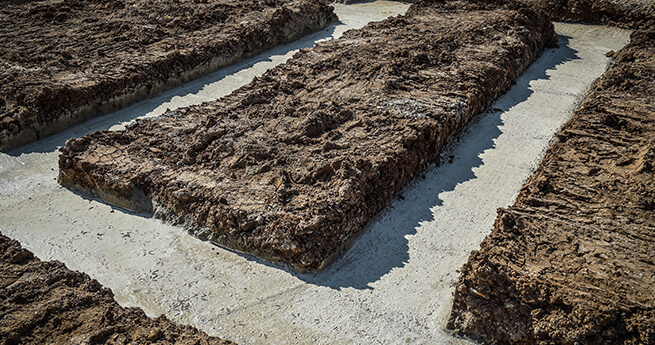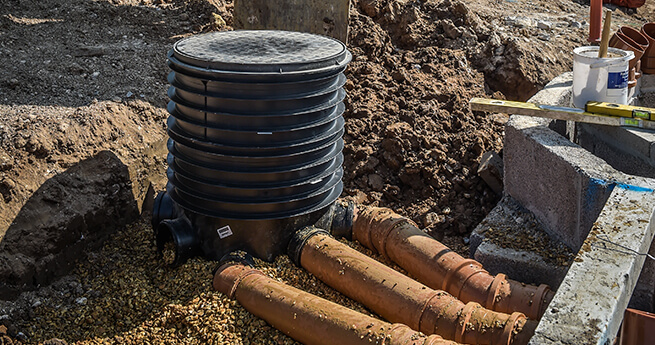
08 November 2018
Groundworks is the overarching term we use to describe the core services we offer here at Mackoy and it's one you'll come across a lot on our website, Facebook and LinkedIn pages, as well as right here on our blog too. You'll even notice that we occasionally refer to our operatives as groundworkers or groundworks operatives. Wow, we really do like to say groundworks a lot.
To us, groundworks (see, we did it again) are what we do on our clients' sites every day but to anyone not in the trade groundworks can be a confusing concept. Especially as it doesn't refer to just one service but lots of different individual processes.
In fact, quite often, groundworks is the term used to describe any works that happen above or below ground in order to get a plot of land ready for development. Which is likely how the common expression "putting in the groundwork" as a general term to describe a period of preparation came about. So when we talk about groundworks what we're actually referring to is a process of ground preparation.
It's just like when you bake a cake. You start with a recipe (which in our case is our clients' site drawings), you assemble all the ingredients (the building materials) and you follow a process to get you from these raw ingredients to the finished baked cake (the house). And what's one of the first things you do when you're baking? You pre-heat the oven of course.
Well, groundworks is a bit like that. Before the bricklayers, electricians, roofers, plumbers and fitters can come in and do their bit we have to get everything ready for them i.e. the groundworks. And, just like with a recipe or a house build the groundworks process always follows a specific order.
1. Site Investigations or ground investigations
A site investigation is something that happens at the outset of planning a development, at the point when you're still shopping around for the perfect piece of land for your project.
These types of investigation can involve small excavations to see what the make-up of the soil is like as you begin digging down, as well as taking spot samples away for further testing. Some site investigations can be performed remotely while others may involve several visits to the land over a long period of time.
The purpose is to assess the land to determine its suitability for development, as well as unearthing (excuse the groundworks pun) any potential problems or contaminated land issues, which may make it unusable. The majority of local authorities in Britain legally require a site investigation to grant permission to a development. Not to mention, the results can help to hinder investment into a plot of land that's undevelopable. So their importance to the groundworks and development process can't be downplayed.
2. Earthworks
When you've acquired your land, had permission granted on your plans, and any existing structures on the site have been demolished that's when the earthworks part of the groundworks process can begin.
Earthworks are the key stage in getting a development site primed for infrastructure works. The process involves removing any and all vegetation from the site, including trees that aren't protected by a TPO (tree protection order), revealing the soil underneath the surface. But can also involve using road rollers to level out any unevenness on site to achieve a flat and level base layer to build on.
Earthworks are usually undertaken by large plant such as 360 excavators that make easy work of stripping away topsoil layers. The excavated earth is removed by dumper trucks and taken off site for ethical disposal, a service known as muckaway. In some cases the soil is repurposed in other areas of a site to help create elevations or infill any holes. This is known as cut and fill.

3. Foundations and substructures
When the earthworks are through the next stage for our groundworkers is to begin marking out foundation lines on site. These will determine where each home on a new development will be positioned, down to its exact footprint, so foundations need to align with approved site plans 100%.
The first stage in foundation setting out involves using chalk marking to create visible foundation boundaries on the ground's surface. At this stage we also mark all corners with pegs too so the foundation lines are clearly visible. Once we're satisfied they're to the required specs a client agent will sign them off and then we can begin the excavations to create the foundations for real.
It's important to spend time getting the foundation lines right before you start digging as it's more time-consuming and costly to correct mistakes with foundations after excavations have started. If the building also has a basement it's at this stage that you'll create this sub-structure too. This is where retaining walls come into play.

4. Retaining Walls
Retaining walls, or retaining structures, are a type of wall that has earth bearing down on one side. They're commonly used in the construction of underground basements but also above ground to help create manmade elevations and prevent soil from land sliding.
Not only do they have to withstand pressure from thousands of cubic tonnes of earth bearing down on them, retaining structures also keep the integrity of a structure intact, preventing it from collapse. So they have to be engineered to exacting mathematical specifications as well as safety factors in adherence to the International Building Code.
There are a variety of different ways you can construct a retaining wall and which approach you choose depends largely on the usage, your budget, and any aesthetic considerations. Not all are free draining or waterproof either, so if any part of your project does require a retaining wall the best thing you can do is consult an expert groundworks and civil engineering specialist.
5. Sewers and underground services infrastructure
Just as foundations need to be dug to root a house firmly to the ground the infrastructure also needs to be prepared for sewer pipes and essential services to be connected.
Again, this is a key part of the groundworks services we provide at Mackoy so on our clients' sites it falls to us to ensure these trenches are dug in the correct places. All in time for utilities companies to come out and make the services live.
With sewers we also lay the pipes in place too, ensuring that every home on our clients' builds have both a wastewater and a surface water drainage system in place. Something that's been required of every new home built in Britain since the 1970s and a key aspect of keeping Britain's riverbeds and seas free from pollution.

So, as is pretty evident, groundworks isn't an in and out job. Not least of all when you're working on a residential development site with upwards of 100 new homes. That's why it's pretty typical for us to be on site for our clients for anything from a year or more. Usually from day one of a build beginning and staying until the last paving slab is laid or road surface tarmacked.
In fact, the groundworks services we've highlighted in this post aren't even the full scope of our remit at Mackoy. Our contracts also involve developing roads and highway infrastructure. Including making adjustments to existing roadways (278 works) along with laying beam & block flooring and oversites too. We even help to create recreational green spaces on our clients' builds such as football pitches, children's playgrounds and parks as well as car parks, driveways and planting trees on site.
Groundworks is far from a one-dimensional job but that's why we work with over 300 experienced and CSCS trained operatives in our gangs, and own over 150 plant. Just two of the reasons why leading house builders turn to us to complete their groundworks infrastructure.
To see what else we're capable of take a look at our services page.
Categories: Services
Fill in your name and email address and we'll keep you up to date with our latest Mackoy news and developments. (by entering your details you consent to Mackoy sending emails)